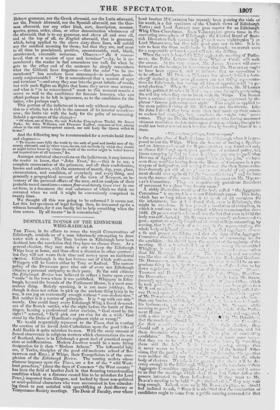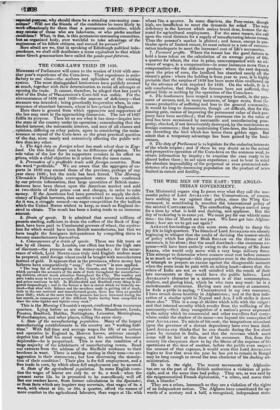DESPERATE DOINGS OF THE EDINBURGH WHIG-RADICALS.
THE Times, in its efforts to rouse the torpid Conservatives of Edinburp, reminds us of a man laboriously attempting to draw water with a sieve. The Tory leaders in Edinburgh have been drubbed into the conviction that they have no chance there. At a general election, they may make a stir to keep the Edinburgh Whigs busy at home, and thus effect a diversion in other quarters ; but they will not waste their time and money upon an incidental election. Edinburgh is the last fi.rtress out of which petit-maitre Whiggery will be beaten either by Tory or Radical. The narrow policy of the DUNDASES gave nme out of every ten Edinburgh citizens a personal antipathy to their party. By the said citizens the Edinburgh Review was believed to reflect a lustre upon every. "cadie " in the town where it was published. Whiggery in Edin- burgh, beyond the bounds of the Parliament House, is a most ano- malous thing. Strictly speaking, it is not mere ,jobbing; for, though it does not refuse to pick up the unclean thing lying in its way, it can jog on contentedly enough without " con-si-dera-tion." But neither is it a matter of principle. It is " up with our side" merely. One could fancy every Edinburgh Whig a lineal descend- ant of the Scotch suttler, who the night before the battle of Det- tingen, hearing a professional sister exclaim, " God stand by the right ! " retorted, " De'il pick out yer e'en for sic a wish : God stand by the Duke o' Hamilton's regiment right or wrang!" We would respectfully represent to the Times, that in wasting the unction of its fervid Anti-Catholicism upon the good folks of Auld Reekie it quite mistakes its men. With the same amount of formal observance in religious matters which characterizes the rest of Scotland, there is in Edinburgh a great deal of practical scepti- cism or indifferentism. Modern Laodicea would be a more fitting designation for it than " Modern Athens." The influential laity are, if Tories, disciples of the good old moderate school of Ro- IIERTSON and HILL; if Whigs, their Evangelicism is of the com- plexion of' the Edinburgh Review. The ranting zealots whose clamour imposes upon the Times, are a few of the " wild West- land preachers," (since the days of CniumioN "the West country" has been the field of brother Jack in that flaunting tatterdemalion condition which at a distance caused him to be mistaken for Lord Peter,) imported fi-om Glasgow, and backed by those non-political or semi-political characters who were accustomed in less stimulat- mg times to rest satisfied with speechifying at Anti-Slavery or Temperance-Society meetings. The Dean of Faculty, over whose head brother M'Cixnmsn has recently been pouring the vials of his wrath, is a fair specimen of the Church, views of Edinburgh Tories ; and Lord JEFFREY may pass muster for an Edinburgh 'Whig Ultra-Churchman. Even 'Voluntaryism grows tame in the enervating atmosithcro of alinburgh : the Central Board of Scot- . fish Dissenters bark oceasionelly (" an it were nightingales") at Lord MELBOURNE, but tir,y take good care not to bite. It is in vain to beat the drum ecclesiastic in Edinburgh : no recruit even for a respectable feel:weed sec,ta:1 vli take the When the writ is issu:-71 1::•r et the meeting of Parlia- moot, the Polite Letter-v :'ter frem Wile" er Castle will walk the course. At the very litaio.4, 1Tr. AYTOUN will COIWt forward on the hustinn to demonstrate that Mr. MACAULAY ought to have been epposed, and to intim:et... t7e,t no opposition is to be offered. 3Ir. DuNcAN 'ILAREN issued a kali- sheriff declaring that meee plecomen ere yet t7tt'ee representa- tives for Edinburg-h, but waving all ilea of epposiiiea till "a ge- neral election." \Then the 7R1 lti tion;t:TIves, Mr. McLAREN and his political friends will tied .,etee ceetit• fix again postponing the evil day when they are to break with the Whigs. The Scotch
have a sarcasm age.ie:t preteaars to (arly expressed by the
phrase " famous gett, ever m'erbe." This might be applied to the stern politiced eileue of Mr. 31..1. %TIEN and his friends. Like Sir John Fal•-•eel, they have more then half made up their minds to eschew bad cempany' but, somehow, the " right time never comes. They are like the Gilmerton carter, who having mustered virtuous resoluticn to determine upon giving up whisky, thought he dram.not bettcr rcw.-Ird such heroism than by treating himself to a. l ele!lora lAcTiera minor," is the ne pins Itadiea.1 viam.• in Edininn•gli when it is pro- posed to cut the Whigs. When the honour of hateng a Speaker
and an Attornev-n,ral •••• llepres,:nt:eives V;25 found not only
to silence Ediefeare-h upen questi of renional policy, but (more annoyieg by far) to !,.e..e it ei:!: •,:: any one to push what
DOWNIE of Appin would l ..v rmici • '.'s n wee jobs,' we have
seen these worthies is see.,: the Commons in a pa.
roxysm of indignation, met •,-, w...• the then 'Representa- tives decently got rid of, ' o- el:lc:le:I of any govern-
ment should ever again sit 7e.• "1•, :.7.-11;" and WC have
seen the names of the s:.• on Mr. 31.4.cAu-
LAY'S Committee. Th, e:egnirieenti \ gratuitous furnishers
of pavement for a place •• e C'. rimname:' A richly illustrative I: :t ,,f the beJv called " the Aggregate
Committee" is reported :I. ..ereent Ed:1St:rah paper. This body, which has so long taken 11-„eat it to Teak- en all occasions for the inhabitants, has at. 1: •-t fmnd that, even in Edinburgh, this might be overdone. It hes passed a resolution of extinction, in which it confesses to havieg eeisted without reconstruction since 1832. (It passes over s,:1,•••iu silence the fact that even in 1 S32 the body was self-elected.) Mr. It •nu. very properly endeaveured
guar„ against no cudIy l 1 eketoral college succeeding, by moving, that in the event of a in the representation, the whole body of Lilee•Al. Le called together to choose
a fit and proper ceelil.te, md that the duty of the Aggregate Committee shoeld !e , .,,j o the werk of canvassing, &c. for the candidate, ',Ale sh‘e•7•1 heee Cie seeeert of the majority of the meeting. 11,1,1 a i• H•-•,!:,71 1,, n t7 :enonq• the es,,,eibled
Inglings, ..•_ 7• than 3Ir. eel
was like that o .1,! 11 e le -cr eenine- f 7
Zoo14,cal Gardens. Mr. DoxAT,I,N. ".ac :7. '• it wee1,1 be an un-
gracious thing in a :t •., . •!' di.. le•ion to lay down regulr. 1,•11- THOMSON and 1117, 7.res,r3. the Demostheie • I••e•.) ••;it.tw.,
(recently appeiet
be took pretsting ;177 ;7
W. S. not an advoc • ; e.;; the wee Dean,) opened •
of Mr. Dox.u.ns..N7,, !!
' than any barrist:r, ' his instruments, lea :at
seeming to gualel hi, re, meat House. " 17:•. Pb:
with a view to 70t that the resolwiee. :•hee:d. b.a,..
for their cc:., -;• : ••• .1 . etior,
should call a pei•::e , •!' tors, and let them determine NV, nominatieg candidates." lime I. Ae • •• '1. ••• •• your men--
that they are to he ab,. 0_ 7"e. , lv "stroking them witk the 'r." •'• stranu that it never seems to le.„.• .• • • ,f the learned Attie-
nians, that the pzee:. '••rmine recee4ion were neither the •:•7.1 hot Oh: whole
body of electors. Wc. t., 0:11 be de- cency enough in the E,' :..t...1)ers of their Aggregate Committee appoint, Ci at . ••• •e, • • • and it seems
• e
to us that the meetings which elect tI.• at 1,t•ttcr define the powers intrusted to them beforchee.". If they trust to Mr. BrAmes meeting to be held " qffer their clecti .e." they may wait long enough. Indeed, -Yore we in Mr. Russie.:.'s place, we dinuld feel inclined to ask, " Since it is admitted that the nomination of candidates ought to come from a public meeting convened for that lespeeialinwpose, why should there be a standing- canvassing com- mittee? 'Will not the friends of the candidates be more likely to Wairk.effietiniously for them than a permanent committee, which maynsistiof those who are lukewarm, or who prefer another candidate? What, in fine, is this permanent canvassing committee, but an organized body, ever watchful to take advantage of the supineness of its fellow citizens, and exceed its powers!'" Sore afraid are we, that in speaking of Edinburgh political inde- pendence, we shall still desiderate a tense equivalent to that which some Greek grammarians have called the paulo-post-faturum.



























 Previous page
Previous page